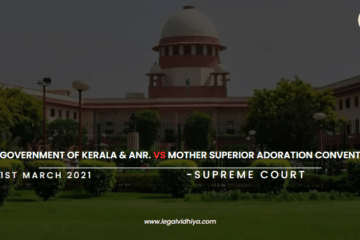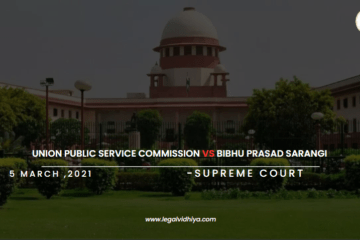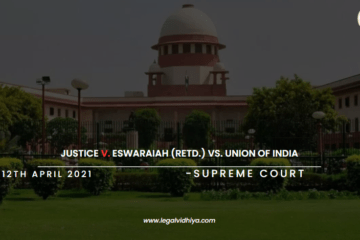
| CITATIONS | AIR 2021 SUPREME COURT 1563 |
| DATE OF JUDGEMENT | 15 March 2021 |
| COURT | Supreme Court of India |
| APPELLANT | Arun Kumar Jagatramka |
| RESPONDENT | Jindal Steel & Power Ltd |
| BENCH | M R Shah, Dhananjaya Y Chandrachud |
INTRODUCTION
The Insolvency and Bankruptcy Code (IBC) has rules to prevent people who caused a company’s financial problems from being involved in its rescue or liquidation.These rules apply to both rescue plans (resolution plans) and liquidation sales.If a company is being liquidated under IBC, these rules also apply to any compromise or arrangement schemes proposed under the Companies Act.The Supreme Court has upheld these rules, ensuring that people who caused a company’s financial problems cannot be involved in its rescue or liquidation.
FACTS OF THE CASE
- Gujarat NRE Coke Ltd. was in financial trouble, so it went to the National Company Law Tribunal (NCLT) to start a process to fix its financial problems.The company’s promoter, Arun Kumar Jagatramka, submitted a plan to save the company. However, a new law (section 29A) was introduced that said promoters like Arun Kumar Jagatramka couldn’t submit such plans. Because of this new law, Arun Kumar Jagatramka’s plan was rejected, and no other plans were submitted. As a result, the NCLT decided to liquidate the company (sell off its assets to pay off debts).
- After the company was ordered to be liquidated, the promoter (Appellant) went back to the NCLT with a new proposal under the Companies Act. This proposal was to make a deal between the promoters and creditors to save the company. The NCLT allowed this proposal, but Jindal Steel and Power Ltd., a creditor, appealed against this decision.
- The NCLAT (an appellate tribunal) overturned the NCLT’s decision, saying that someone who can’t submit a rescue plan under IBC (due to section 29A) also can’t propose a compromise scheme under the Companies Act. The promoter then challenged this NCLAT decision in the Supreme Court.
- The Insolvency and Bankruptcy Board of India (IBBI) made some changes to the Liquidation Process Regulations in 2019 and 2020. These changes added a new rule (Regulation 2B) that says someone who can’t propose a rescue plan under IBC also can’t be part of a compromise or arrangement to save the company. The promoter (Appellant) challenged these changes in the Supreme Court, arguing that they are unconstitutional. Specifically, the Appellant filed a writ petition under Article 32 of the Constitution, which allows the Supreme Court to review laws and regulations for constitutional validity.
ISSUES OF THE CASE
- Can someone who is not allowed to rescue a company under the Insolvency and Bankruptcy Code (IBC) still propose a plan to save the company under the Companies Act?
- Is Regulation 2B (a rule made by the Insolvency and Bankruptcy Board of India) illegal or unconstitutional because it: Goes against the Insolvency and Bankruptcy Code (IBC) and the Companies Act?. It violates fundamental rights guaranteed by the Constitution, specifically: Article 14 (equality before law),Article 19 (freedom of speech, occupation, etc.), Article 21 (right to life and liberty)?
CONTENTION OF THE PETITIONER
1. Regulation 2B is ultra vires (beyond the power) of the Insolvency and Bankruptcy Code (IBC) and the Companies Act, as it unfairly restricts the rights of ineligible persons to propose a compromise or arrangement under Section 230 of the Companies Act.
2. The regulation violates Article 14 (equality before law) of the Constitution, as it discriminates against ineligible persons by preventing them from proposing a compromise or arrangement, while allowing others to do so.
3. The regulation violates Article 19 (freedom of occupation, etc.) of the Constitution, as it restricts the petitioner’s right to carry on business and propose a compromise or arrangement.
4. The regulation violates Article 21 (right to life and liberty) of the Constitution, as it affects the petitioner’s right to livelihood and reputation.
5. The petitioner argued that the IBC and Companies Act should be read harmoniously, allowing ineligible persons to propose a compromise or arrangement under Section 230, despite being ineligible under Section 29A of the IBC.
6. The petitioner also challenged the retrospective effect of Regulation 2B, arguing that it unfairly affects their rights and interests.
CONTENTIONS OF RESPONDENT
1. Regulation 2B is a clarificatory provision that reinforces the intent of Section 29A of the IBC, which bars ineligible persons from submitting a resolution plan.
2. The regulation is within the powers of the Insolvency and Bankruptcy Board of India (IBBI) under the IBC, as it aims to prevent ineligible persons from circumventing the provisions of Section 29A.
3. The regulation does not violate Article 14 (equality before law) of the Constitution, as it applies equally to all ineligible persons and is a reasonable restriction to ensure the integrity of the insolvency process.
4. The regulation does not violate Article 19 (freedom of occupation, etc.) of the Constitution, as it only restricts the petitioner’s ability to propose a compromise or arrangement, not their right to carry on business.
5. The regulation does not violate Article 21 (right to life and liberty) of the Constitution, as it is a reasonable restriction to ensure the integrity of the insolvency process and does not affect the petitioner’s right to livelihood or reputation.
6. The respondent argued that the IBC and Companies Act should be read harmoniously, but in this case, the provisions of the IBC (Section 29A) take precedence over the Companies Act (Section 230), and Regulation 2B is a necessary clarification to prevent ineligible persons from exploiting loopholes.
7. The respondent also argued that the retrospective effect of Regulation 2B is necessary to prevent ineligible persons from taking advantage of the time gap between the introduction of Section 29A and the regulation.
JUDGEMENT OF THE CASE
The Supreme Court (SC) upheld the validity of Regulation 2B, which prevents certain individuals (like promoters) from proposing a compromise or arrangement plan (scheme) to revive a company undergoing liquidation. As the same individuals are already barred from participating in the resolution process (under Section 29A) or selling assets of the company in liquidation (under Section 35(1)(f)). Allowing them to propose a scheme would lead to absurdity.Three modes of revival: The SC identified three ways to revive a company:
1. CIRP (Corporate Insolvency Resolution Process): Under Chapter II of the Code.
2. Sale of assets or business: As a going concern, under clauses (e) and (f) of Regulation 32.
3. Compromise or arrangement: Through Section 230 of the Companies Act.
ANALYSIS OF THE CASE
The IBC and Companies Act have different eligibility criteria for proposing plans. Section 29A of the IBC bars certain persons, including promoters, from submitting resolution plans, while Section 230 of the Companies Act allows promoters to propose compromise or arrangement plans. The Insolvency and Bankruptcy Board of India (IBBI) introduced Regulation 2B, which clarifies that ineligible persons under Section 29A of the IBC cannot propose compromise or arrangement plans under Section 230 of the Companies Act. Arun Kumar Jagatramka argued that Regulation 2B is ultra vires, violates fundamental rights (Articles 14, 19, and 21), and has an unfair retrospective effect.The respondent argued that Regulation 2B is a clarificatory provision, within the powers of the IBBI, and does not violate fundamental rights.The Supreme Court upheld the validity of Regulation 2B, finding it to be a reasonable restriction that applies equally to all ineligible persons. The court rejected the petitioner’s arguments and dismissed the appeals and writ petition.
CONCLUSION
When a company is in financial trouble, it can try to revive itself through a compromise or arrangement (C&A) scheme under the Companies Act.This process involves multiple layers of checks and balances, including creditors and the National Company Law Tribunal (NCLT), to ensure that the scheme is fair and works for both the company and its creditors.Because of these safeguards, the concerns that Section 29A of the Insolvency and Bankruptcy Code (IBC) tries to address (like preventing people who caused the problem from being involved in the solution) don’t apply to C&A schemes. If the rules from IBC were applied to C&A schemes, it would weaken the chances of the company’s revival and go against the wishes of the creditors, who have agreed to the scheme.
REFERENCES
https://indiankanoon.org/doc/144360866
This Article is written by Mugdha Chaturvedi, a student of Delhi Metropolitan Education, Affiliated to Guru Gobind Singh Indraprastha University Intern at Legal Vidhiya.
Disclaimer: The materials provided herein are intended solely for informational purposes. Accessing or using the site or the materials does not establish an attorney-client relationship. The information presented on this site is not to be construed as legal or professional advice, and it should not be relied upon for such purposes or used as a substitute for advice from a licensed attorney in your state. Additionally, the viewpoint presented by the author is of a personal nature.




0 Comments